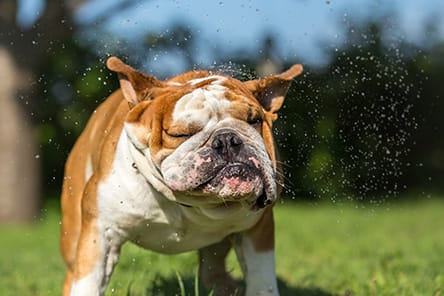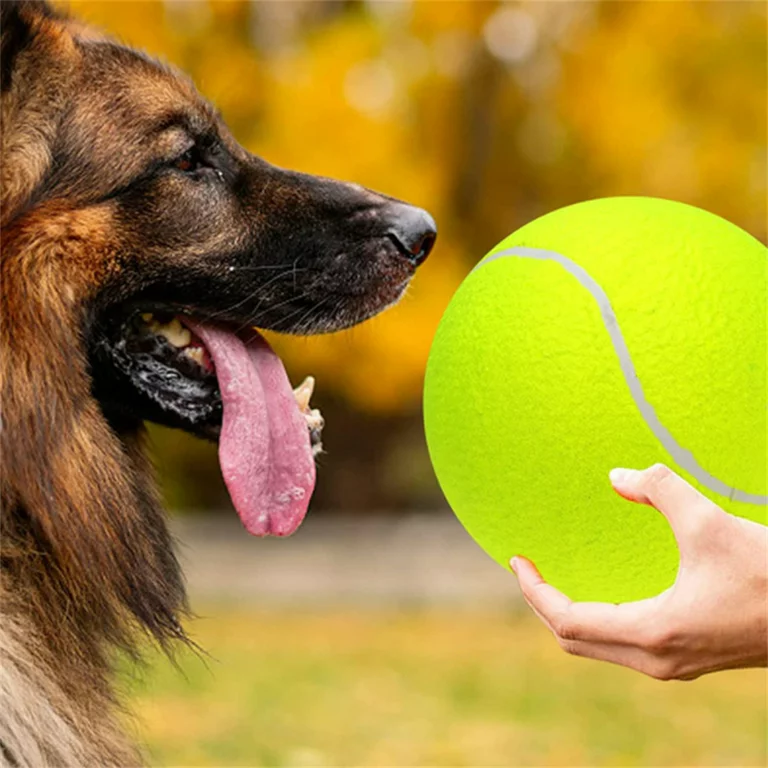Why does my dog keep shaking his head Dogs exhibit many behaviors that can puzzle us, from peeing on branches to rubbing in unpleasant scents, walking in circles before lying down, and shaking their heads—sometimes quite vigorously. Head shaking, however, is typically a normal behavior for dogs. It serves as a handy way for them to address discomfort or irritation, such as itching, in their ears. Dr. Georgina Ushi Phillips, a veterinarian based in Florida who blogs at Not a Bully, sheds light on this common dog behavior.
Why Do Dogs Shake Their Heads?
Dogs typically shake their heads to scratch an itch or dislodge something from their ears,” explains Dr. Phillips. “It could be as simple as a bug landing on their head or water getting in their ears after a swim, or it could be more serious, such as an ear infection or debris stuck in the ear.” While occasional head shaking is normal, excessive shaking could indicate an underlying issue, prompting a visit to the vet. Let’s delve into some potential reasons why your dog might be shaking their head.
When Is Head Shaking A Sign Of A Problem?
“If you observe your dog repeatedly shaking their head with only brief pauses, it’s likely a sign of an issue,” Dr. Phillips advises. “In such cases, it’s advisable to schedule an examination with your veterinarian.” Here are some common reasons why your dog might display this behavior:
Water In the Ears
Similar to humans, dogs will shake their heads to dislodge water trapped in their ears. Soap can also irritate their ear canals. Always ensure to thoroughly dry your dog’s ears after bathing or swimming.
Allergies
Certainly, dogs can experience allergies. Their allergies may stem from various sources such as the food they consume or environmental factors like mold or seasonal pollen. Head shaking could indicate itchy ears due to allergies. Additional signs may include frequently rubbing their face with paws and chewing at their paws.
Ear Infection
Yes, dogs can indeed develop irritating ear infections caused by yeast or bacteria. If you notice accompanying symptoms like redness, swelling, or discharge in the ears, it’s time to take your furry friend to the vet. The vet may prescribe ear drops or other treatments to address the infection. It’s important to note that an infection can occur deeper in the ear where signs may not be readily visible, so professional assessment is crucial.

Ear Mites Or Ticks
Ear mites and ticks are common parasites, particularly in dogs that spend time in wooded areas or grassy fields. When inspecting your dog’s ears, be sure to check for ticks, which should be promptly removed. Ear mites, however, are more challenging to detect due to their small size. Look for tiny white dots and dark, waxy discharge in the ears. Dogs with ear mites may also exhibit scratching and rubbing at the ears. Your veterinarian can prescribe medication to effectively clear up ear mite infestations.
More Serious Problems
While less common, some neurological disorders could also cause head shaking. If your dog appears off balance, holds its head at a tilt, or exhibits sudden behavior changes, it’s crucial to take them to the vet immediately for evaluation.
Additionally, your dog might have a foreign object lodged in its ear, possibly too small for you to detect, such as a blade of grass. A veterinarian can locate and safely remove any foreign objects, providing necessary relief for your pet.
Your dog has itchy ears
Head shaking in dogs often stems from itchy or irritated ears. Since dogs don’t have hands, they resort to shaking their heads or scratching and pawing at their ears to alleviate discomfort. Various factors can cause this irritation, including infection, grass seeds, mites, fleas, and bacteria. If your dog displays persistent head shaking, it’s crucial to have their ears examined by a veterinarian to identify and address the underlying cause.
To relieve pain in their head
When dogs experience discomfort in their neck or head, they may resort to shaking their heads as a means of relieving pain. This discomfort can stem from various sources, such as wearing a collar that’s too tight or sustaining an injury that may not be immediately visible. If you notice your dog shaking their head persistently, it’s essential to investigate the cause, including evaluating the fit of their collar and seeking veterinary attention if necessary.
To clear their ears of water
When dogs indulge in swimming, they often end up with water trapped in their ears, a sensation familiar to anyone who’s experienced it themselves. This discomfort prompts them to shake their heads vigorously to dislodge the water. It’s crucial to ensure their ears are thoroughly dried afterward, as water in the ears can lead to infections, commonly known as swimmer’s ear. If you suspect water is causing the issue, carefully dry your dog’s ears and monitor them for signs of irritation or infection.
Your dog may be stressed
When dogs become overly excited or aroused, it’s not uncommon for them to exhibit behaviors like head shaking or even full-body shaking. Some dogs may also sneeze as part of their response to heightened excitement. It can be quite a sight to behold! If you want to delve deeper into understanding canine body language and explore techniques for calming your dog down during such situations, our guides offer valuable insights. They provide comprehensive information on interpreting your dog’s behavior and effective strategies for managing their excitement levels.
Should I be worried that my dog is shaking their head?
If your dog’s head shaking seems excessive or sudden, it’s crucial to take notice and investigate further. Check their ears for any signs of infection or injury, and consult your veterinarian if you have any concerns. Ear infections can be painful for dogs if left untreated, so prompt veterinary attention is essential.
It’s interesting to note that various breeds have different ear-related issues. French Bulldogs may experience issues due to their pricked ears, while breeds like Cockapoos and Cavapoos may require regular ear grooming to prevent problems. Water-loving breeds like Labradors and Cocker Spaniels may be prone to water buildup in their ears, but keeping them clean and dry after swimming can help mitigate any issues.

Conditions associated with head shaking in dogs
Head shaking can indeed indicate various underlying illnesses or conditions in dogs:
- Ear Infections: Yeast, bacteria, and mites can all lead to ear infections, causing discomfort and prompting head shaking.
- Skin Allergies: Food allergies can trigger skin allergies in dogs, leading to itching and irritation that may result in head shaking.
- Aural Hematoma: Also known as cauliflower ears, this condition occurs when blood or fluid accumulates in the ear flap, causing swelling and discomfort.
- Chiari-like Malformation (CM) and Syringomyelia: These conditions, more common in certain breeds like Cavalier King Charles Spaniels, can cause neurological symptoms such as head tremors and shaking.
- Idiopathic Head Tremors and Seizures: Some dogs may experience head tremors or seizures without an apparent cause, indicating an underlying neurological issue that requires veterinary attention.
It’s essential to observe your dog’s behavior closely and consult with a veterinarian if you notice persistent or concerning symptoms like head shaking, as they could indicate an underlying health problem.
What do I do if my dog keeps shaking his head?
If your dog is shaking their head, it’s essential to take some steps to ensure their well-being:
- Inspect Their Ears: Check if their ears look dirty, smelly, red, or sore. Start by cleaning their ears, and if your dog belongs to a hairy breed, trim the ear hair.
- Use Ear Cleaner: Consider using an over-the-counter ear cleaner like Epi-otic, known for its effectiveness. Ensure that the ears are not left moist after cleaning.
- Check for Sore Spots: Examine their head and neck for any sore or hot spots that might be causing discomfort.
- Keep a Diary: Monitor what you feed them and when head shaking occurs to identify any patterns.
- Document with Video: Capture a video of your dog shaking their head to show your vet or a puppy training expert for better assessment and advice.
- Consult Your Vet: If you notice signs of ill health or ear infections, contact your vet for a check-up. They can provide a proper diagnosis and necessary treatment.
In summary, head shaking in dogs is often related to ear problems, such as ear infections, which can be managed with regular ear cleaning and grooming. However, it’s crucial to consult with a vet for any medical issues to ensure your dog’s health and well-being.
Now that you have insights into managing head shaking in dogs, you might want to learn more about ear mites or get tips for new puppy owners. And don’t forget, our team of dog trainers in the Zigzag app is always ready to assist you with any dog or puppy-related queries. Download the Zigzag app today for personalized training programs tailored to your puppy’s development stages.
Why is My Dog Shaking Its Head? 8 Possible Causes
1. Food or Environmental Allergies
When dogs shake their heads excessively, it could be a sign of itchiness inside their ears, which may be caused by allergies. Similar to humans, dogs can develop allergies to various substances in their environment, such as dust, pollen, or molds.
In addition to head shaking, dogs with allergies may exhibit other symptoms like itchy skin, repeated scratching, or rubbing. If you notice these signs alongside head shaking, it’s essential to consider the possibility of allergies.
Diagnosing allergies in dogs typically involves skin testing, blood testing, or diet elimination trials. Once diagnosed, your veterinarian can recommend treatments to alleviate your pet’s symptoms and discomfort. Long-term management strategies, such as allergen avoidance or immunotherapy, may also be discussed to help your dog live comfortably despite their allergies.

2. Foreign Objects
When your dog is exploring the outdoors, foreign objects like grass seeds or plant debris might become lodged in their ear canal. When this happens, excessive head shaking is their way of trying to dislodge the object.
However, it’s crucial not to attempt to remove the object yourself, even if you can see it in your dog’s ear canal. Trying to extract it without proper tools or expertise could push the object deeper into the ear or cause harm to your dog’s hearing.
Instead, it’s best to seek assistance from your veterinarian, who can safely and effectively remove the foreign object from your dog’s ear. They have the necessary tools and knowledge to perform the procedure without causing harm to your furry friend.
3. Water in the Ears
If your dog loves swimming or baths, water can sometimes get trapped in their ears, leading to excessive head shaking. To prevent this, consider using a pet-approved shower cap to cover their ears before water activities. When bathing your dog, be cautious not to let water enter their ears. Instead, gently clean their head using a damp washcloth or brush.
In case water does get into your dog’s ears, treatment involves administering a drying solution after exposure to water to reduce excess moisture within the ear canals. However, any treatment should always be carried out under the guidance of a veterinarian to ensure the safety and well-being of your pet.
4. Ear Infections
Bacterial or yeast infections in the ears are a frequent cause of dogs shaking their heads. If you notice redness, inflammation, discharge, or an odor in your dog’s ears, it’s likely they’re experiencing an infection and discomfort.
It’s crucial to have your dog evaluated by a veterinarian promptly if you observe these symptoms. Untreated infections can quickly worsen, leading to more severe health problems for your furry friend.
5. Ear Mites
If your dog seems to be shaking its head incessantly, it could be grappling with a parasitic infection caused by ear mites. While not as prevalent as bacterial or yeast infections, these mites invade your dog’s ear canals, triggering itchiness and discomfort. While they might be observable if you peer into your dog’s ears, it’s advisable not to attempt removal without professional assistance.
6. Ticks
Spending time outdoors, particularly in wooded areas, increases the likelihood of your dog encountering ticks. These tiny parasites can burrow into your dog’s skin, potentially settling in or around their ears and causing irritation and discomfort. Check the area around your dog’s ears meticulously for any signs of ticks, including small insects partially embedded in the skin. Prompt removal of ticks is crucial as they can transmit various diseases. While you can sometimes manage tick removal yourself, if the tick is deeply embedded, refrain from attempting removal, as improper extraction can result in serious infection. It’s best to seek veterinary assistance in such cases.
7. Tumors
Occasionally, dogs may develop tumors in or around their ears, which can lead to pain or discomfort. If you have an older dog exhibiting persistent head shaking, there’s a possibility they could have a benign or cancerous tumor.
It’s essential to consult with a veterinarian to evaluate the possibility of tumors. Your vet may conduct diagnostic tests such as otoscopy, x-rays, scans, or biopsies to identify any growths and determine their nature. Early detection and appropriate treatment are crucial for managing tumors effectively.
8. Neurological Conditions
In older dogs, sudden or progressive loss of balance can sometimes be attributed to neurological conditions.
One common condition, vestibular disease, manifests suddenly and may cause symptoms like head shaking, lack of coordination, stumbling, and falling. Although alarming, this condition typically begins to improve within days.
While most dogs fully recover within several weeks, some may retain a slight head tilt afterward. Excessive shaking or tremors unrelated to other conditions could indicate a different neurological disorder affecting balance or movement.
If you suspect your dog has a neurological condition, it’s crucial to seek veterinary evaluation and a neurological exam for proper diagnosis and management.
How Can I Relieve Head Shaking in Dogs?
Pet parents should refrain from attempting to resolve head-shaking at home without consulting a veterinary expert. Until the underlying cause of the head shaking is determined, it’s essential to provide love, affection, and proper care to your pet, including keeping them clean, hydrated, and well-fed.
Even if you believe you’ve identified the cause of your dog’s head shaking, it’s crucial to seek professional advice before administering any medication or treatment. This ensures that the appropriate course of action is taken to address the issue effectively and safely.




